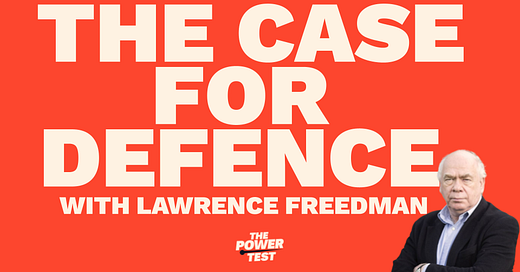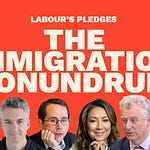How will Labour confront the range of security threats facing the UK across the world? Sir Lawrence Freedman, renowned academic, historian and author on foreign policy and international relations, reflects on the grave challenges a Starmer Government will face in a dangerous world.
It’s a family affair this week on The Power Test with Sir Lawrence Freedman joining Sam and Ayesha to discuss how a Labour Government might deal with an international situation that he describes "as difficult a time as I can remember.”
"There have been conflicts in the Middle East before and the issue of the rise of China has been around for some time,” he says, "but I think what's going on between Russia and Ukraine is very serious. We haven't had a war like that in Europe since the Second World War, and we don't quite know how this is going to end. Some of the endings are more dangerous than others.”
Sir Lawrence believes that Keir Starmer is deliberately keeping his foreign and defence policies close to the Government’s for both political and diplomatic reasons.
"There isn't a lot of difference between Labour's defence and foreign policy and the Conservatives' defence and foreign policy. This is partly because Starmer was keen to distinguish himself from Corbyn who undoubtedly would have been taking very different positions on the current situation in all of its aspects. But it was also because actually what Russia has done in Ukraine is pretty clear, and there was never any question that that it had to be resisted."
This continuity in policy, he says, will be welcomed in Washington and other major Western capitals.
“It's not as if anybody in the United States or elsewhere is expecting a big shift in British policy as a result of a new government. They'll just assume that there'll be continuity and that, I think, probably works to Starmer's advantage because his domestic agenda is going to be pretty large when he gets in, and rows about foreign policy are probably the last thing he'd want while he's trying to get himself settled in.”
A Trump presidency will bring new uncertainty that a new Labour Government will be forced to navigate and cope with.
“We're assuming, given what he said, that there'd be a shift on Ukraine, although I think with Trump, the difficulty is that everything goes through his own narcissistic instinct. One of the things Putin is worried about with Trump is that Trump's peace plan — basically confirming Crimea and the Dombass to Russia— isn't as much as Putin wants.
“So, if Putin, presented with this peace plan, said no you can never be sure how Trump will respond. The best assumption is that, basically, he doesn't want to get entangled in other people's quarrels and fights. He's an isolationist by instinct. I think the big issues with Trump, to be frank, will be economic as much as these.
“Around Europe, there is real concern not that he'll put pressure on Europeans to raise defence spending but that he may just not want to be involved in NATO at all and disengage. The problem for NATO was the problem for the Europeans is they don't really have an alternative. The EU can't compensate for this so they're going to have to try to make Nato work and hope that Trump's a blip if he does get in which is not absolutely certain."
Sir Lawrence warns Labour about trying to return to claim to be pursuing an “ethical foreign policy”.
"Robin Cook when he he became Foreign Secretary famously talked about an ethical foreign policy. Ethics are important but [foreign policy] is often about competing moralities. The basic problem with an ethical foreign policy is that you have to deal with countries that have practices you don't like and it inevitably leads to accusations of hypocrisy.
“So, take Saudi Arabia. It’s a country that's really important to the international economy, to the energy markets and to stability in the Middle East. Yet it's hard to cheer on its domestic policies and human rights issues. But you have to deal with it. I mean there's no way of saying we refuse to deal with you because we don't like the way you run your country.”
And how will a Labour Government manage discontent among its own ranks and supporters on issues like Gaza?
"Gaza is obviously the most difficult and, while one would hope that we've moved on from this round of fighting to try and do something about reconstruction by the time of the General Election, that can't be guaranteed.
“I think a Labour Government would be under enormous pressure to take a hard line on and put pressure on Israel. But Cameron's been doing and he's been quite blunt in some of his statements. Starmer might go further than that but that's the direction of western policy.”















Share this post